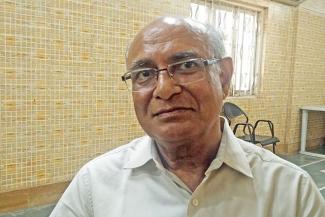
Sometimes willpower can knock out even health adversities. As in the case of 72-year-old Rajendra M Thakkar, retired General Manager of Reserve Bank of India, who straightened out his speech impairment, a symptom of Parkinson’s, through sheer grit and diligent exercises.
When my Parkinson’s set in a few years back, I was in the midst of cardiological issues and bypass surgery, and didn’t pay much attention to the mild trembling of my hands and legs. But when my speech started getting affected and I began slurring, that’s when the severity of Parkinson’s shook me.
I Could Not Speak With My Sons
My speech deterioration would have gone unnoticed for some more months probably, had it not been for my sons, settled in Frankfurt and Netherlands. Both my sons being chartered accountants shared my passion for finance and we would talk at length on the phone. Problem began when I felt I was not being heard clearly and my son would ask me to repeat myself several times on the phone. Initially, I would dismiss it as poor telephone line quality. But each time they called, they would find me unclear and barely audible. After a few occasions, I became quite conscious of my voice.
Now when the phone would ring, a general fright would overwhelm me. I would move away from the phone and would immediately call my wife. She would first start the conversation, and in the meantime, I would cough and clear my throat. But my voice would still be soft, hoarse, often slurred. My sons would have difficulty hearing me. I tried to speak as loudly as possible, but my voice would just not come out powerful. It was as if someone was holding my vocal cords and preventing me from speaking. I realized that my conversation with them was getting shorter and shorter. I was finding it difficult to hold a long, sustained exchange with them. They could not hear me properly on the phone. My voice was:
- Not audible, speech had become softer in volume.
- Not steady; it would break or become hoarse.
- Not slow paced, bits of words would be eaten up in an attempt to speak fast.
- Not controlled. There would be repetition or missing words.
The change in my voice and lack of clarity began to worry my sons and they advised that I consult a doctor without further delay. Losing my coherence and not being able to communicate with my children was also beginning to trouble me greatly.
In 2014, when I was diagnosed with Parkinson’s disease, I had gone to Dr B S Singhal, Director of Neurology at Bombay Hospital. Now I consulted him again for my speech problem. He informed me that in addition to the classic motor symptoms of Parkinson's (tremor, slowness, stiffness, walking and/or balance problems), a person may develop changes in speech and/or swallowing. Although these problems can occur at any time in the course of Parkinson's, they are more common as disease progresses.
Speech Therapy and Parkinson's
Dr Singhal advised that I enrol into Ali Yavar Jung National Institute of Speech and Hearing Disabilities for speech therapy. Being extra conscious about my health, I registered at the Institute immediately. There I was given some 10-15 facial exercises to do. They were a combination for strengthening vocal cords, facial muscles, speech and voice system, correct posture and breathing. I would learn the exercises at the Institute and then come and do them again at home for an hour daily.
For example, to increase speech volume - I had to pretend I was shouting at some one. It may sound funny but it’s true that in 72 years I have never raised my voice at anybody. Now to suddenly pretend that I was scolding someone did not come naturally to me initially. But now with practice, I can be louder than others.
Another exercise I remember is the tongue exercises for clear articulation. I had to stick my tongue out to the furthest extent possible and then move it from side to side.
After a year of diligent exercise and practice, today I can talk to my sons on the phone like before; there is no slurring, no softness, no stammering. Nobody can tell that I ever suffered from speech impairment. I am back to having long discussions with them on all matters related to finance. You see, banking, commerce, financial matters are my passion. I read about them with great interest. I seldom read anything else.
I control my other aspects of Parkinson’s like trembling and shaking by visiting the PDMDS * (Parkinson’s Disease and Movement Disorder Society) centres opened across the city. I not only visit the one in my locality, but also attend the session in other centres, so that I am able to exercise all 5 days of the week. All the centres are efficiently and affectionately managed and it is a pleasure going there.
My advice to others with Parkinson's
The 3 things I would like to tell others with Parkinson’s is -
- Be meticulous about medicines, exercises, work.
- Have a balanced diet.
- Make use of PDMDS centres regularly.
* (Dr Bhim Sen Singhal, Director of Neurology at Bombay Hospital is the main brain behind the Parkinson’s and Movement Disorder Society (PDMDS) in India. It was in 2000, he founded PDMSD with experts from Mumbai, Kolkata, Delhi, Hyderabad, Nashik, Pune, Goa, Bhavnagar and Bengaluru pledging to help the cause. Along with its team of neurologists, psychologists, physiotherapists and various medical, allied medical and fitness professionals, PDMDS has extended its reach to cities throughout India. PDMS has received worldwide recognition actively advocating for the cause of Parkinson’s or other motor disorders. The society has been acknowledged as a model for developing countries by organizations like the World Parkinson’s Congress and the World Federation of Neurology.)






